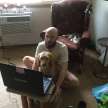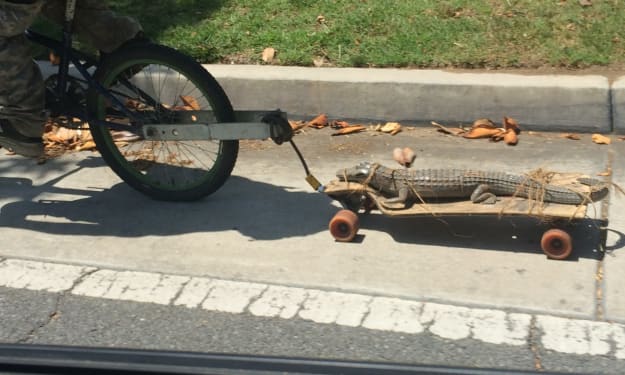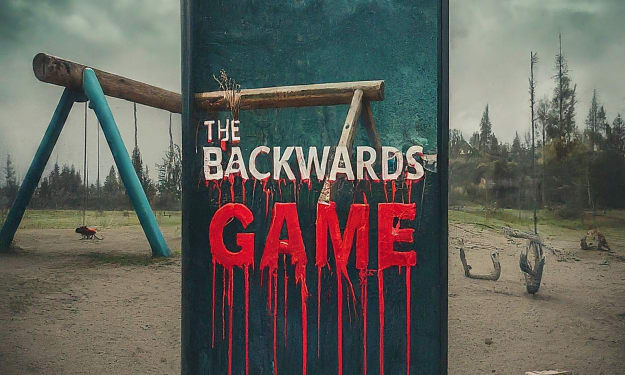La Guillotine
A Psychological Horror (Short Story)

There was a single window to the cell through which I watched the sun and the moon rise in rotation five times, guided between the iron bars. I spent most of my time watching those yellow and white balls being slung skyward in their cosmic juggle. The sky turns lilac and amber with burning yellow, and it wanes lavender and amethyst with gleaming white. It’s not that I’d never paid any attention before. Dead men, it seems, pay special attention to the heavens.
There was a sooty man among others with whom I’d been forced to share the cell. I can barely remember his face now, though he was there before I arrived and he was there when I left. All I can picture is his God awful grin. How could a mouth be at once so toothy and so hideously barren? It was not the rotting remnants of tooth or the pulpy gums that made his grin so wretched. It was what he’d said that made him grin at all.
“I am told,” he said on the third day of my imprisonment, “that the eyes still move, the forehead still knits, and, most captivating of all, the lips twitch and tremor as though they wish to form words.”
“Told by whom?”
“Heard it from everyone close enough to see.”
“And I’m supposed to believe you? You, who could not be trusted to keep your sausage-fingers to your own lying pockets? Don’t speak to me again.” He was a wretched man, the type that ought to be in jail. Not like me.
There was a splintering bench across from mine upon which he stayed slumped like a worn bale sack, running his blackened hand this way and that over the iron bars of the cell. He took special care to strike his grimy nails against the metal so that, among the snorting and hacking and spitting that issued forth from the neighboring cells and the rolling roar from the mob that crowded the courtyard outside, the sound of his tedious clinking would bounce off the stone walls and into my wretched ears.
“Better a thief than a turncoat,” his absent reply, and he continued to worry the rusted iron.
I am no turncoat. I’ve always been an honorable politician of the people, falsely accused of conspiracy. I had no business being in that cell to begin with.
It stuck with me, what that sooty imbecile had said. I found myself recalling an old friend of mine who had been a respectable physician in Lyons before the revolution. He had once told me something similar of corpses: that thumbs may jerk, toes may flutter, lungs may exhale hours after the soul left the body. It was the lingerings of primal life, my physician friend explained to me, relieving itself of its rotting host. I had not asked him whether or not a severed head might maintain some semblance of consciousness or awareness. All reason—and I am a reasonable man—would have suggested otherwise.
I waited five days in that cell before I was removed. By the third day I had exhausted all of the emotions a dead man can have. It was with a clear head, then, that I turned my eyes to the interminable juggle of heavenly amber and amethyst. Through that very same window came the grind of the blade, rising and falling in the courtyard below; an interminable juggle of steel and wood, and flesh; an interminable juggle of life to death. A crowd of hungry people came and remained. In cycles did I hear them, roaring and quieting. The silence was the most dreadful, blade grinding to the top of the scaffold, the long yawn of the wretched mouth preparing for that single bite. A muffled clunk as the steel tooth is fastened at the height of the scaffold and the prey is prepared. Hungry humans—quiet; eager. The blade is released. It comes down with that sound of a stone being rolled across a plank of wood. This, the last that I hear before the crowd surges, and shouts, and gnashes their own chattering teeth. I know there to be another sound that would reach my doomed ear, were I near enough to hear it—a sort of dull sound, as blade cleaves wood; a miserable clunk as tooth meets mandible; the same sound that hatchets make as they’re buried into the chopping block. This sound I hear, but only as a phantasm. My mind—my wretched mind—produces it for me. More than the knowledge of my impending death, it was my continuous search for that somber thud that nearly drove me to madness. Always, the surging crowd drowned it out.
It was in the scarlet morning of the fifth day that the ragged gaoler stopped outside my cell. It would be the last time I’d have to hear his wretched feet shuffling, and it would be the last time I would hear anyone speak my name.
“Marchand, Allard, Bissett, Dupont, et Cobb; allons-y. Let’s go.”
Waiting in that cell, listening to the grinding and the roaring, and straining to hear that fatal thud—these only made me further long for my soul’s release. I placed myself at the front of our line of five. I intended to be the first beheaded so that I’d no longer have to suffer in anticipation.
We were prodded by rusting knives into an unsteady tumbrel which would take us to the steel and wood. The hungry crowd paid little mind to the cart of newcomers, except for an eager few who hurled rotten food and mud upon us. The rest were enchanted by the looming scaffold in the center of the courtyard, raised for the convenience of the spectators at the reaches of the heaving mass.
A man was bent over at the foot of the scaffold when the cart was halted, his head latched in the lunette, his black hands balled in fists, tied at the small of his back. We were seized from our seats and stood up behind him. Despite my best efforts, I was placed second in line. I did not know the man before me except as a huddled shadow from the corner of the cell. He was all I could stand to look at in the midst of the roaring sea, and I noticed every detail of him as he glanced around at the thirsty crowd. His cheeks were covered in dark stubble, his nose came to a hook at the tip. His eyes were dark and sad. They turned down at the outer edges. His cheekbones were high. He must have been a dashing man before his incarceration. I glanced only once at the man behind me. He was a beady-eyed man who hadn’t stopped weeping since he arrived yesterday afternoon.
Again, the roar and quiet of the enthralled crowd, like a furious orchestra set to the beat of the angled blade. Even there, at the foot of the beast, I found myself straining to hear that dull thud.The blade dropped, the black fists loosened. There was a filthy boy whose duty it was to push the limp, sagging body off the scaffold into an adjacent cart with other sagging bodies, all to be hauled to some trough and reunited with the dirt. I cannot see what is on the other side of the looming guillotine, but this side is stained brown and maroon.
The stubble-faced man before me was dragged onto the platform and kicked in the crook of the knee. The executioners with their black hoods were large men—larger than he and larger than I—and they tossed around the starving man with the indifference of a butcher preparing a cut of meat. They harnessed him into the machine and jerked the lever. The stained blade fell, grinding against the wooden beams, the same as I’d heard it through my window. The man’s fingers unclenched and his heels turned to the sides. Red cascades spattered upon the scaffold and dripped slowly down the woodwork. The filthy boy was again summoned. Through the lunette appeared the gnashing humans.
An arm’s length from the guillotine and I still could not hear the thump of the blade.
My toes became icy and my hands clammy. My heart, to my surprise, did not rush.

I was grabbed at the shoulder and kicked in the crook of my knee, and I fell. One of the butchers turned a crank to lift the blade. Over the block I went, neck pressed through the half-moon, lunette slammed at the base of my skull. There was something slimy, a warm sensation, and it adhered to the hair on my neck. Then did I notice the horror on the other side of the guillotine.
A wicker basket, stained brown and maroon. Pale, semi-alarmed faces looking east, and west, and north, and south, and to the heavens and the earth. Mouths open, aghast. There, on the top of the brimming basket, I again saw that man, with his dark stubble, and his high cheekbones, his hooking nose, and his oozing neck. I could not take my eyes from him. The machine pushed against my throat, and I could not draw a full breath. The shallow breathing at last sped my poor heart.
The blade, reaching its height in the scaffold, shuddered the great machine. Quiet from the crowd. They ogled my helpless body—I know they did, because they ogled all of our helpless bodies. Everything slowed in those moments. I was in that lunette longer—far longer, it seemed—than the stubble-faced man before me.
Even if I had tried, I would have been unable to take my eyes off him there in that wicker basket. There was still something there—a twitch. It was more than the mechanical shiver of dead flesh; more than a quivering toe or a bending thumb. His sad eyes were still moving. His head was sideways to me. I saw him. His eyes turned, up toward his forehead, and downward, and they blinked. They turned towards me, and we locked eyes. He could see me from the basket—I knew that he did. His eyes became fearful and wild. Another twitch, lower on the face. His lips quivered, and trembled, and strained, tried to part, to perform that duty they’d ever known. Another twitch at the corner of the mouth, and the eyes straightened, and the lids loosened. He was gone.
There was grinding, and it swooped down upon me. The people screamed, and hollered. In that moment, with my ears next to the mandible, I could at last hear the grisly thud, and then I was the one who fell.
The world made a whipping turn. A short distance I tumbled, and all was again still. The shuffling of feet on the scaffold, and another thud into the cart adjacent. I could not suck air. There was nothing with which to pull.
I could still feel. Not my icy toes or my clammy hands—those were gone—but my nose, and my cheeks, and my skull. There was something stubbly pressed against my cheek, and in the back of my head I could feel the rubbery flesh of a frigid nose.
I shifted my eyes downward, where there was only darkness. Forwards, the rim of the wicker basket, and beyond that, the quieting crowd. They were looking above me, and there did I turn my eyes. Another pair of small, beady eyes were watching me from the lunette. I caught the attention of the beady eyes. I knew that he saw me. I tried to speak, to shout, but there was nothing with which to speak. My parched lips quivered, and did not part, and I resigned myself.
This all has come rushing to my memory, here, in this state of mine. The sooty man was true all along. The eyes, the forehead, the tremoring lips...
Darkness has begun to descend, a great shadow over the mass of people.
There is a glimmer of bright light that descends above me. There is shouting. I am going now. The beady eyes are coming, too. He tumbles onto me, his skull cracks against mine, the same as I’d often felt as a frolicking boy. And then he tumbles further, out of the basket—mine was the content that set it too full. He rolls in front of me on the platform, comes to a stop on his cheek, facing me, and we lock eyes again. He blinks.
I am going now.
His eyes shift. His lips quiver. His forehead knits.
Another head peers at me from above, a shadow against the cornflower sky.
This, the last I see.






Comments
There are no comments for this story
Be the first to respond and start the conversation.